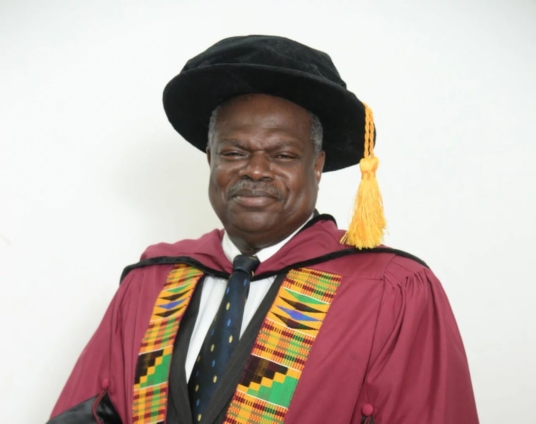Former Vice Chancellor of the University Of Ghana, Professor Ernest Aryeetey, has called for the expansion of the Science, Technology, Engineering, and Mathematics (STEM) educational project introduced by the President Akufo-Addo’s administration to meet growing demands, particularly people living in rural areas.
This comes amid growing fears among Ghanaians that the next National Democratic Congress (NDC) administration, led by John Mahama, will cancel the Free Senior High School policy—a claim denied by the NDC Transition Team.
Prof Aryeetey raised this concern during the Ghana Academy of Arts and Sciences Higher Education Project Conference.
According to him, the incoming administration should pursue programmes that will promote specialisation through hands-on learning in Science, Technology, Engineering and Mathematics.
"The African Union, through the Agenda 2063, has highlighted the kind of support that needs to be given to higher education, boosting the number of students, especially in STEM, encouraging the growth of high-quality higher education institutions, and putting pressure on governments to put aside 1% of GDP for research. And that's something that is important., there's research that shows that when countries have a good number of global it also has an impact on their economic growth. And that research done in Europe shows that the highest-performing OECD countries also do have the highest-performing research universities.
"So that is something that we can learn from. Universities are dynamic institutions and therefore must adapt. I get worried when we treat universities in Africa as if this is what the government has mandated that you do and so you stay with it until the kingdom comes. There must be a strategy that reflects not just on the numbers, but how do we make our planning program more acceptable, more interesting, more exciting. We must embrace change and we must embrace change in a very significant way. There are many, many challenges. Everybody knows the challenges, but we should not stifle initiative.
"We should not stifle the dynamism of universities wanting to be different. We don't need to force them all to look alike. We don't need to force them to all do a narrowly defined set of programs. Let them through their own dynamism, let them through their own search for resources be able to navigate the waters and find where they are most comfortable," he said.
Meanwhile, Prof Toyin Falola, Professor of African Studies at the University of Texas at Austin believes transforming universities in Africa to match the twenty-first-century global technological space is key to improving the standards of living of people.
"Nigeria controls one-third of the Bitcoin industry. Nigerian, Ghanaian youth, to those of us who do research among them, discover their capacity for coding, for programming, for certification, which they are now putting to good use. The leading frontiers in the humanities and theories are futurism, Afropolitanism, Cosmopolitanism.
"These are products of African intellectuals that we do not celebrate enough. If you go to the Institute of African Studies, University of Ghana, go and visit their archives, the Nketiah Museum, you will see tremendous contributions to cultural preservation, historical preservation, that we don't celebrate," Prof Falola added.
Latest Stories
-
OSP appeals acquittal of Juaben MCE nominee in alleged bribe case
13 minutes -
Empowering Africa’s Digital Future: How Artificial Intelligence is driving sustainable network infrastructure
38 minutes -
Republic Bank Ghana PLC records GH₵210.67m revenue in 2024
49 minutes -
Influence of market queens creating food shortages and causing high food prices – Dr. Ofosu-Dorte
52 minutes -
Surging travel in Europe spikes concerns over tourism’s drawbacks
53 minutes -
Federal Government hands over houses to 1994 Super Eagles heroes after 31 years
54 minutes -
Air India crash attributed to pilot seat malfunction
1 hour -
GCAA and South Korea sign letter of intent to advance Ghana’s drone sector
1 hour -
Republic Bank Ghana promises improved lending to customers, prospective home owners
1 hour -
Ghana ranks among top 6 African economies in Intra-African trade – Afreximbank Report
1 hour -
Allied Health Professions Council warns against unlicensed practice
1 hour -
Energy Minister engages petroleum sector stakeholders on laycan concerns
2 hours -
‘We played a great second half’ – Black Queens coach on friendly against Benin
2 hours -
Yara Ghana deepens commitment to women in agribusiness
2 hours -
Afreximbank has been a pillar in Ghana’s economic journey – Deputy Finance Minister
2 hours

